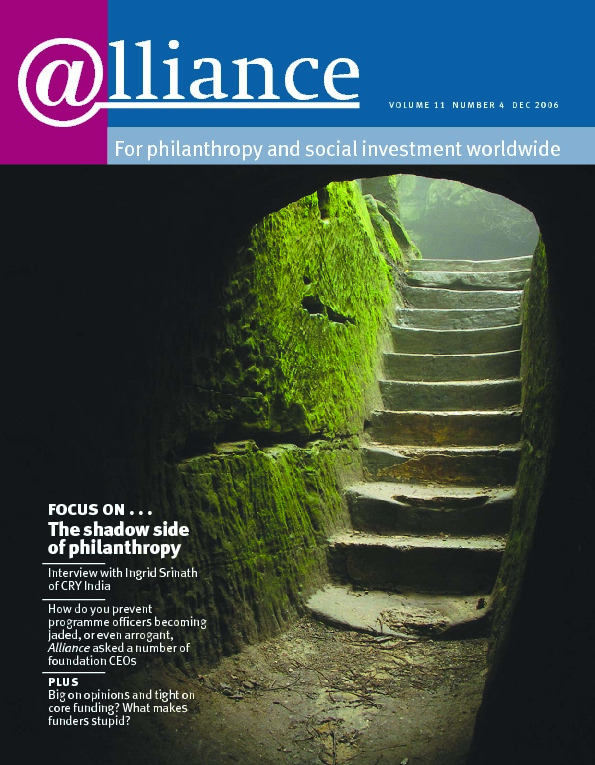I take away three things from Anne Firth Murray’s personal history of the Global Fund for Women that I suspect will last the test of years.
The first is a specific set of principles and guidelines for social organization from a feminist paradigm. This is visionary stuff told with precision and authenticity. Anyone setting up or running a fund or an NGO may want to read this book and share it with trustees and staff. It sets out operating instructions ‘to change our paradigm of social interaction from either/or to both/and, from win/lose to win/win’.
In a series of chapters covering every aspect of organizational life, Professor Murray describes in detail what it means to make grants in this way. Consistent with her both/and philosophy, she relates how the Global Fund for Women emerged as a response to the prevailing top-down, professional-driven models of philanthropy and development, but rather than dwelling on the faults of this paradigm, she celebrates the new ‘paradigm found’. Words like patriarchy, male domination and the like do not appear in the book. Rather, she talks positively about empowering women who are self-organizing to advance themselves and their communities. This book rises above the contest for power and aims for synthesis at a higher level.
Moreover, the Global Fund for Women demonstrates the qualitative and often intangible dimensions that lie at the heart of sustainable social change. At a time when the prevailing opinion among donors is obsessed with measuring outcomes, Professor Murray shows how sustainable outcomes follow from right process. She teaches that we cannot achieve social change through a narrow focus on measuring ends. Rather, we must begin and end with the empowering of those most affected by that which needs changing.
The second thing that came through strongly for me in reading this book is the realization that the Global Fund for Women is anything but alone. In the past 30 years we have seen a gradual and hopeful proliferation of quick-dispersing funds targeted at grassroots changemakers. These funds have different immediate purposes – women’s empowerment (Global Fund for Women, Mama Cash, Urgent Action Fund, African Women’s Development Fund), social entrepreneurship (Ashoka), environment (Global GreenGrants) and human rights (Fund for Global Human Rights, Norwegian Human Rights Fund and Empower). But they converge in their core values, organizational cultures, and characteristic ways of working. They disperse quickly, with minimum application requirements, usually small grants ($1,000–$10,000) for general purposes and with few strings attached.
Their main aim is to empower the changemakers, in part by trusting them in two profound ways. First, relying on the minimum bureaucratic due diligence, they trust them to use their grants effectively. Second, they trust that they are best placed to figure out the longer-term solutions and their own next steps. As Professor Murray writes of the Global Fund: ‘Our role was to provide support to allow their voices to be heard and their choices [to be respected].’
We are yet a long way from the day when the craft of bottom-up empowerment becomes the norm. The current swing toward mega-foundations and multi-billion dollar ‘global funds’ of a very different type from the Global Fund for Women testifies to the vigour of supply-side, top-down development. But it seems certain as one reads this book that it is a question of when, not whether, we will all enjoy the inclusive, learning approach to social organization.
The third thing I take from Professor Murray’s book is the inspiration of a life well lived. The lessons on leadership in the book all point to the power of inclusion. ‘An important way that we can make a major difference to the future is to demonstrate leadership within our own organizations to change the way our business is done. All of us can create systems and structures that stress the value of diversity, inclusiveness, collaboration and caring.’ It is liberating to be inspired by the individual who has led in this collective way.
Here I must declare an interest. I have known and admired Anne Firth Murray since first running into the Global Fund for Women in South Africa in 1991. Every word in this wonderful book rings true to my experience of the Global Fund and Anne Firth Murray over the past 15 years. And now I add a debt of gratitude for this recording of her work.
David Bonbright is CEO of Keystone. Email david@keystonereporting.org
Paradigm Found: Leading and managing for positive change
Anne Firth Murray New World Library $14.95
ISBN 1577315332
To order
http://www.newworldlibrary.com






Comments (0)